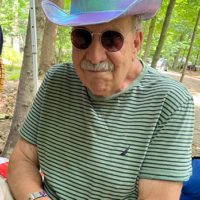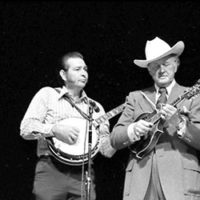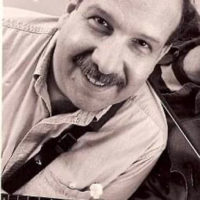Steve Arkin passes
![]()
Noted banjo and guitar player, and former Blue Grass Boy, Steve Arkin, passed away on Wednesday, August 24, 2022, in Boston, Massachusetts, following a cerebral aneurysm. 78 years of age when he passed, he was to be considered to be “a living Old Time Music encyclopedia.”
Born in New York City, on May 1, 1944, Stephen Ivan Arkin fluctuated between old-time (clawhammer) and his own brand of 3-finger melodic style banjo. Some of his relatives, including his older cousin, actor Alan Arkin, played the guitar.
Alan, the lead singer of The Tarriers taught Steve basic guitar chords – aged 13-14. At about the same time he first heard the banjo, citing The Weavers at Carnegie Hall. Drawn even more to Pete Seeger, Arkin acquired his first banjo.
Shortly afterwards he became aware of the musicians who frequented NYC’s Washington Square on Sundays, joining the likes of Bob Yellin, Eric Weissberg – an early Greenbriar Boy and the session musician famous for coming up with the Dueling Banjos track – Peter Wernick and Roger Sprung. The first two were big influences at that time.
Arkin learned about bluegrass music in the way that many others did in the 1960s, mainly via Flatt and Scruggs and Foggy Mountain Breakdown.
Arkin formed his first band in 1960 joining other jam session players who gathered in Washington Square Park, including mandolinist Jody Stecher, Frank Benedetto, and Greg Levasseur.
Arkin met Bill Keith in 1961, and the two banjo players became friends, and Keith encouraged Arkin in whatever way he could. The duo participated in the 1962 Philadelphia Folk Festival bluegrass banjo contest, Arkin earning second place to Keith.
The following year Arkin was runner-up to Winnie Winston in the contest, but won in 1964, having quit the Blue Grass Boys, who played at the festival, so that he could actually participate in the contest.
In 1962, Arkin played with the Down State Rebels, again with Stecher, and featuring Gene Lowinger (fiddle) and Peter Szego (dobro). This combination received the surprising backing of hit pop singer and icon Bobby Darin, and wound-up playing Carnegie Hall several times.
Another band with which Arkin became involved was the Hudson Tubes; again, he teamed up with Stecher, this time on guitar, plus David Grisman (mandolin), Gene Lowinger (fiddle), and Fred Weiss (bass).
This band evolved into the New York Ramblers, a spin-off of which was the delightful sounding Maria & the Washington Square Ramblers, featuring bandmembers such as Grisman and Arkin backing up and coming vocalist Maria Muldaur.
At Marlboro College, Vermont, he honed his bluegrass chops in jam sessions with the likes of Don Stover and the Lilly Brothers.
Urged by Keith and Ralph Rinzler to fill the vacant banjo spot with Bill Monroe, in June 1964 Arkin travelled down to Nashville while on the summer break from college. He stayed just two months, departing in mid-August after feeling the pinch financially. It was an inauspicious time for Arkin with gigs in church basements, drive-in movie theaters, and country music parks. Although he was a member of the Musicians’ Union, he didn’t join the Nashville chapter and thus didn’t play on the Grand Ole Opry.
However, Monroe later said that he played, “the best back-up banjo I have ever heard.”
Returning to New York, Arkin re-joined The New York Ramblers, who can be heard here at the Second Fret in Philadelphia in 1965. At this time the Ramblers consisted of Grisman (mandolin), Arkin (banjo), Jim Field (guitar), and Julie Silber (bass).
if(typeof(jQuery)==”function”){(function($){$.fn.fitVids=function(){}})(jQuery)};jwplayer(‘jwplayer-0’).setup({“aspectratio”:”16:9″,”width”:”100%”,”primary”:”html5″,”file”:”https://www.hangoutstorage.com/banjohangout.org/storage/audio/10/blackberry-10032-391411112009.mp3″});
Arkin then moved to Cleveland, Ohio, and worked for Oxford University Press. His long, successful career as a publishing executive included positions at Little, Brown & Co. and AMACOM Books.
In 1973 he became more-deeply rooted in his first love, old-time music. Encouraged by Peter Szego, now playing old-time banjo, and enthused by hearing and learning about old-time musicians such as Tommy Jarrell, Charlie Lowe, Fred Cockerham, and Fred Cockerham, the more youthful fiddler Bruce Molsky, and the energetic revivalists the Highwood Strings Band, Arkin became immersed in old-time music and for a while he collaborated with clawhammer banjoist Peter Hoover and fiddler Lisa Ornstein.
Bluegrass Au Groton (the band subsequently changed its name to Mass Grass) consisting of Richard S. Brown (mandolin), Fred Bartenstein (guitar), Steve Arkin (banjo), Margaret Gerteis (bass), and Alexandra Tottle (fiddle), among others, were active sporadically in Massachusetts for about a year, circa 1974 and 1975.
In the early 1980s, Arkin began playing bluegrass again, spending several years with Northern Lights, a top Boston progressive bluegrass or newgrass band.
However, Arkin once again became immersed in old-time music with the New York-based Reel to Reel String Band, featuring fiddler Harry Bolick and guitarist Tim Pitt.
In 1999, Arkin performed at Tom Hanway’s Big Apple Bluegrass & Folk Festival. Hanway identified Arkin’s discerning eye …….
“I have his old banjo for starters. He could play.
I enjoyed his challenges musically and personally. He told me once, ‘Bluegrass has to be perfect, or not at all.’
We were looking at a certain band’s dress (leather vests), and they didn’t sing all that well. The playing wasn’t bluegrass standard.
He knew.”
Arkin continued to be active over the past few years as a member of old-time string bands, New Cut Road String Band, Long John and the Tights, and Lightning in the East, as well as playing with Lowdown Hoedowners.
In so doing he made appearances at a variety of music camps and festivals including the Fiddlin’ Bear Gathering, held every Labor Day weekend at the Lake Genero Campground in Hamlin, Pennsylvania; the Boston Old Time jam; the Park Slope Jamboree (Brooklyn); the Rockbridge Mountain Music and Dance Festival (Glen Maury Park, Buena Vista, Virginia); and the Mid-West Banjo Camp, Olivet, Michigan, sometimes teaching both bluegrass and old-time banjo.
Of the Virginia-based old-time band, Troublesome Creek’s, Fast As Time Can Take Me – in a review of for the Old Time Herald – Pete Sutherland said, “Arkin’s adroit playing achieves that most rare combo of beautiful, intricate melody and absolute pedal-to-the-floor drive.”
In 2018 he moved to Melrose, Massachusetts, to enjoy a more relaxed lifestyle.
As well as being a banjo virtuoso, Arkin was an expert on art and design (an avid collector, particularly, of the pottery of Ulisse Cantagalli and other renaissance-style maiolica); and architecture, a world-class teller of shaggy dog stories, a thoughtful gift-giver; and “a wine snob,” according to his nephew Peter Birkenhead.
Here are a few samples of example of Arkin’s picking ……
Steve Arkin on banjo and Paul Brown on fiddle performing Sally in the Turnip Patch and Fiddler’s Reel on May 14, 2011, at Banjo Camp North in Charlton, Massachusetts ….
if(typeof(jQuery)==”function”){(function($){$.fn.fitVids=function(){}})(jQuery)};jwplayer(‘jwplayer-1’).setup({“aspectratio”:”16:9″,”width”:”100%”,”primary”:”html5″,”file”:”https://youtu.be/TJ0E-KDt4I4″});
Appalachian String Band Music Festival (often referred to simply as Clifftop), near the New River Gorge in West Virginia …
if(typeof(jQuery)==”function”){(function($){$.fn.fitVids=function(){}})(jQuery)};jwplayer(‘jwplayer-2’).setup({“aspectratio”:”16:9″,”width”:”100%”,”primary”:”html5″,”file”:”https://youtu.be/9M2VDM4eu8c”});
Humpback Mule – Grace Forrest (fiddle), Steve Arkin (banjo) and Erica Weiss (guitar) – Clifftop 2013
New Cut Road String Band – Roving Gambler/Head of the Creek (Park Slope Jamboree, 2015)
if(typeof(jQuery)==”function”){(function($){$.fn.fitVids=function(){}})(jQuery)};jwplayer(‘jwplayer-3’).setup({“aspectratio”:”16:9″,”width”:”100%”,”primary”:”html5″,”file”:”https://youtu.be/rHsIij5QokQ”});
John Hoffmann (vocal and fiddle), Randy Beckmann (vocal and guitar), Steve Arkin (clawhammer banjo), Jim Reidy (banjo uke) and Sally Freund (bass). Video by Susan Sterngold
Wife Cathy Mason (fiddle) and Steve Arkin (banjo)
Fisher’s Hornpipe (Benton Flippen’s version)
if(typeof(jQuery)==”function”){(function($){$.fn.fitVids=function(){}})(jQuery)};jwplayer(‘jwplayer-4’).setup({“aspectratio”:”16:9″,”width”:”100%”,”primary”:”html5″,”file”:”https://youtu.be/JmulkMMe_sQ”});
John Rossbach (John Rossbach & Chestnut Grove; co-founding member of the nouveau old time ensemble, Mac Benford & the Woodshed All Stars; teacher and, currently, Elkins, West Virginia–based guitar builder), says os Arkin…
“Steve Arkin (along with the late Joe Wilson) was about the funniest storyteller I knew. Great and memorable stories of Monroe tour in the Deep South during the Civil Rights era. But he had a lot of memorable witticisms, original quotes and sage advice for young bluegrass and old-time musicians.
Here is my favorite, ‘Never sacrifice rhythm on the altar of melody.’”
Peter Wernick recalls …
“Steve and I were neighbors in the ’60s in Manhattan when I got to know him. He was a very interesting and entertaining guy besides being a particularly talented musician. He was an early exponent of melodic style banjo and could do it really well with a driving rhythm. As a visual artist he specialized in strange abstract drawings that could be described as spooky, and fit in well with the psychedelic art that was popular in the 60s — a multi-faceted guy who liked to laugh and engage in all kinds of conversations about everything under the sun. He was proud that Alan Arkin, the famous actor, was his cousin as well as an original member of the folk group The Tarriers who had a top 10 hit with The Banana Boat Song in 1957.
When Bill Keith took his leave from playing banjo with Bill Monroe in ’64 he recommended Steve, who then took that highly visible job, the first New Yorker ever to play with Monroe. Steve told some pretty funny stories about being in the Blue Grass Boys that summer. The one that sticks out to me was when Monroe was far behind on paying him and he ran out of money. Bill kept putting him off and not communicating. With no alternative, Steve needed to call his parents collect, to send him some money. If that wasn’t humiliating enough, his only way to call was a pay phone in a rural Southern grocery store with the band bus parked outside and a couple of old boys well within earshot. In telling the story Steve would hilariously depict a young Jewish New Yorker explaining, with that curious but silent audience, his predicament with the Father of Bluegrass. Unlike some northerners who could more or less ‘pass’ in a bluegrass context, Steve couldn’t and didn’t try to conceal his New-Yorkiness during those times when north/south tensions were high.
Steve was a major figure in the New York City bluegrass scene during the seminal years when a lot of us were learning. He and Winnie Winston (R.I.P. 2005) were far and away the two leading players in their generation, winning banjo contests and playing with the best of the New York City groups. Eric Weissberg and Bob Yellin were a generation ahead. This was when Béla Fleck was a toddler!
Another little anecdote — Winnie, and Steve, and I drove to Fincastle in September 1965 for the first bluegrass festival. We were all stoked to be in southern Virginia after our all-night drive. It was my first time there. Steve said, ‘Yes Santa Claus, there is a Virginia,’ which got us a few chortles. We all entered the banjo contest at Fincastle and only Winnie even made the cut. The judges were Ralph Stanley and Bill Emerson, and they must have been unimpressed by the ‘city boys” fancy picking. Cullen Galyean won first place.
Steve’s music finished strong, as he became a great clawhammer player, and commuted to North Carolina to play with the excellent band, Troublesome Creek.
Rest in peace, good old friend.”
R.I.P. Steve Arkin
A musical celebration for family and friends will be held in the new year (2023).
A Discography
David Grisman & Tony Rice / The Gasoline Brothers –
- Bluegrass Pickin’ & Singin’ (Acoustic Disc 2021) 1970s recordings, Mill Valley, California
Troublesome Creek String Band
- Fast As Time Can Take Me (County Records CO-CD-2738, 2005)
Bill Christophersen
- Hell & High Water (self-released by Bill Christophersen, No label or number, March 18, 2008). Three tracks – Widow Haley, Cotton-Eyed Joe and Blind Steer In A Mudhole.
The post Steve Arkin passes appeared first on Bluegrass Today.



